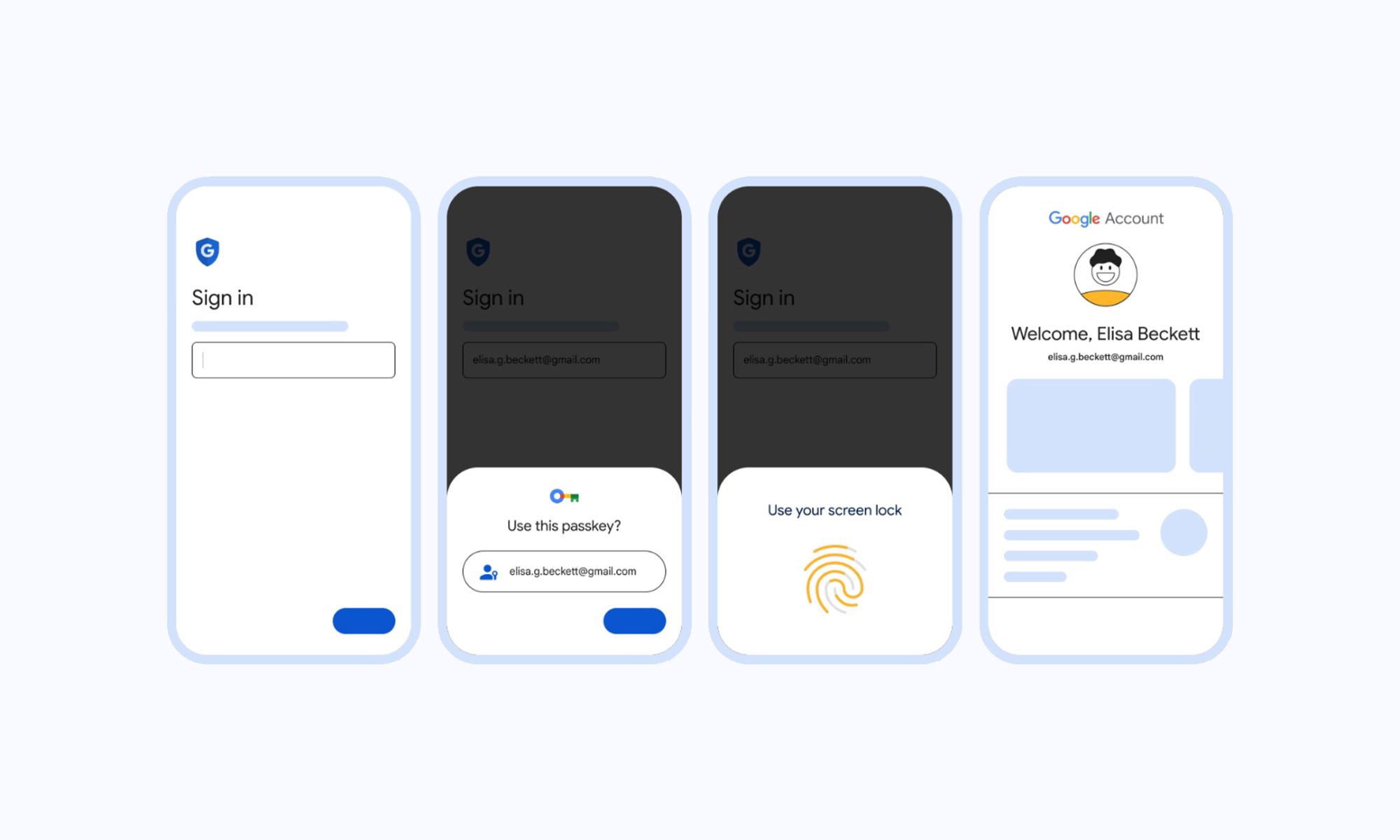News
Passwords Are No Longer Required To Sign Into Google Accounts
Google will allow users to replace passwords and 2FA with passkeys.

Google has taken a step towards a passwordless future, announcing that passkey functionality is being added to all Google accounts.
Passkeys are cryptographic tools that allow users to ditch passwords and two-factor verification when signing in. Google, along with Apple and Microsoft, are keen to push the technology, which uses a local PIN or a device’s biometric tools such as fingerprint scanners or Face ID.
Biometric data from passkeys isn’t shared with third parties and only exists on a user’s device, providing enhanced security since no passwords can be hacked or stolen.
When a passkey is added to a Google account, users will be prompted for it on new sign-ins or when potentially suspicious activity is detected. Passkeys can be stored on any compatible hardware, including iPhones with iOS 16 and Android devices running Android 9 and above. Users can access passkeys on other devices by using services such as iCloud or password managers like 1Password. In addition, Google also allows the following:
- Accounts can be accessed temporarily using someone else’s device by selecting “use a passkey from another device” to create a one-time sign-in.
- Passkeys can be revoked immediately in the account settings section if a user suspects a security breach, or a device is lost or stolen.
- Users of Google’s Advanced Protection Program (a free service providing additional security against phishing and malware) can use passkeys instead of physical security keys.
Also Read: Abu Dhabi Scientists Create Electronic Appetite Regulation Pill
If you’d prefer to log in to your account the traditional way, Google will continue to support regular passwords for the foreseeable future, allowing users without a biometric device to make the change once they eventually upgrade their hardware.
News
UAE Prepares To Launch Two Satellites: Thuraya-2 And MBZ-SAT
HH Sheikh Hamdan bin Mohammed bin Rashid Al Maktoum chaired the first meeting of the Supreme Space Council yesterday.

HH Sheikh Hamdan bin Mohammed bin Rashid Al Maktoum, Crown Prince of Dubai and Deputy Prime Minister of the UAE, chaired the first meeting of the Supreme Space Council in Dubai on December 16, 2024. The session highlighted the UAE’s ambitious space plans and took stock of the sector’s economic progress.
The council emphasized the growing role of private companies in advancing space technologies, noting that their contributions are now equal to that of the public sector. Members also praised initiatives like the Space Economic Zones Programme, which are designed to fuel innovation and investment in the space industry.
خلال ترؤسنا الاجتماع الأول للمجلس الأعلى للفضاء، بحثنا الاستثمارات الوطنية والمشاريع المقبلة في قطاع الفضاء والذي يشهد تطوراً مستمراً… وجددنا التزامنا بدعم ومواصلة تنفيذ برامج طموحة لاستكشاف الفضاء الخارجي حيث وصل حجم الاستثمارات في هذا القطاع إلى 40 مليار درهم خلال السنوات… pic.twitter.com/etJ33OnuSu
— Hamdan bin Mohammed (@HamdanMohammed) December 16, 2024
Discussing the UAE’s space journey, HH Sheikh Hamdan bin Mohammed bin Rashid Al Maktoum remarked, “The national space sector continues to grow and advance, and we take immense pride in the remarkable achievements we have accomplished over the years”.
Sheikh Hamdan also received updates on two upcoming satellite projects: Thuraya-2 and MBZ-SAT. Thuraya-2, developed by Space42, is slated for launch this December. Meanwhile, the MBZ-SAT, created by the Mohammed Bin Rashid Space Centre (MBRSC), will soon follow. MBRSC, a major driver of the UAE National Space Programme, continues to lead the nation’s space-related developments.
Space42 took the opportunity to showcase its advancements, including ongoing collaborations between public and private entities. The company also outlined strategies to promote innovation, boost revenue streams, and create new opportunities for growth in the sector.
Also Read: IBM Opens New Doha Office To Support Qatar’s Digital Growth
The UAE’s current projects build on a growing legacy of space exploration. Back in 2020, the nation made headlines with its Mars mission, successfully sending a probe into the planet’s orbit in 2021. This mission, which is now in its second phase as of June 2024, has been collecting critical data to develop a comprehensive diurnal image of Mars.
The UAE also ventured into lunar exploration with an unmanned mission aimed at studying untouched regions of the Moon’s surface. While the probe ultimately crashed during its landing attempt after communication was lost seconds before touchdown, the effort represented a significant step in the country’s exploration ambitions.
-

 News2 weeks ago
News2 weeks agoSWITCH Mobility To Trial New E-Buses In UAE & Saudi Arabia In 2025
-

 News1 week ago
News1 week agoIBM Opens New Doha Office To Support Qatar’s Digital Growth
-

 News1 week ago
News1 week agoFoundster Is Dubai’s New AI-Driven Company Setup Service
-

 News1 week ago
News1 week agoUAE Prepares To Launch Two Satellites: Thuraya-2 And MBZ-SAT














